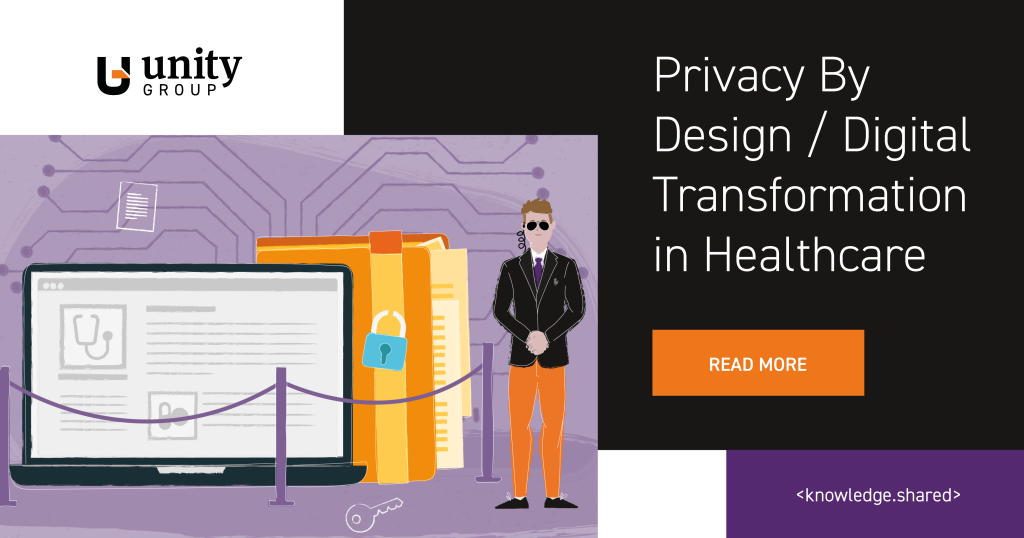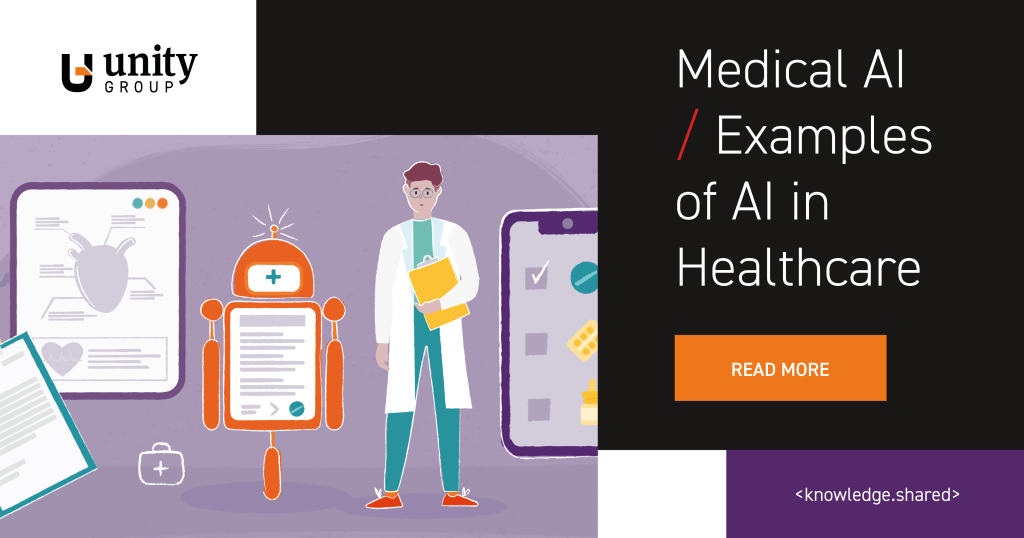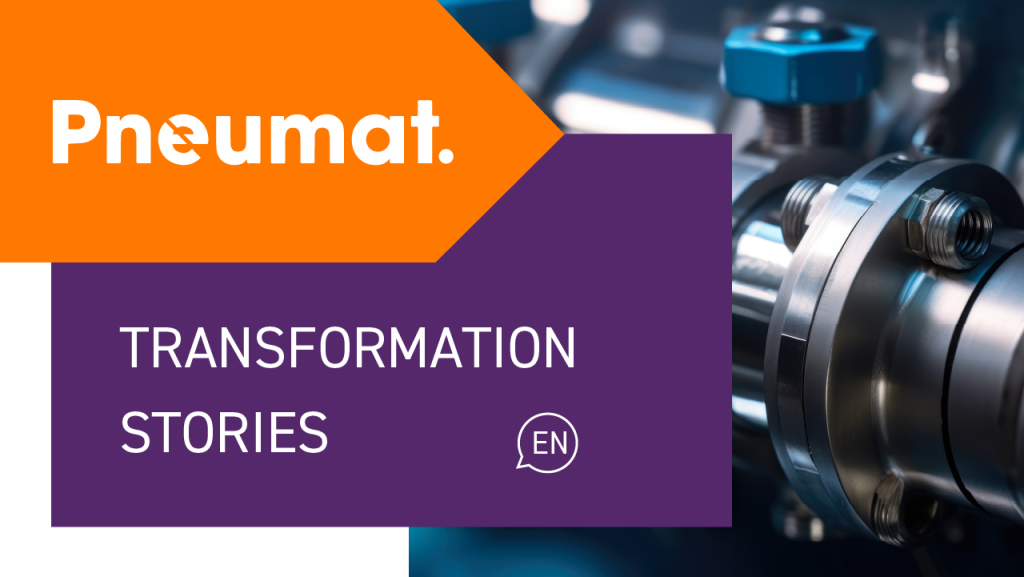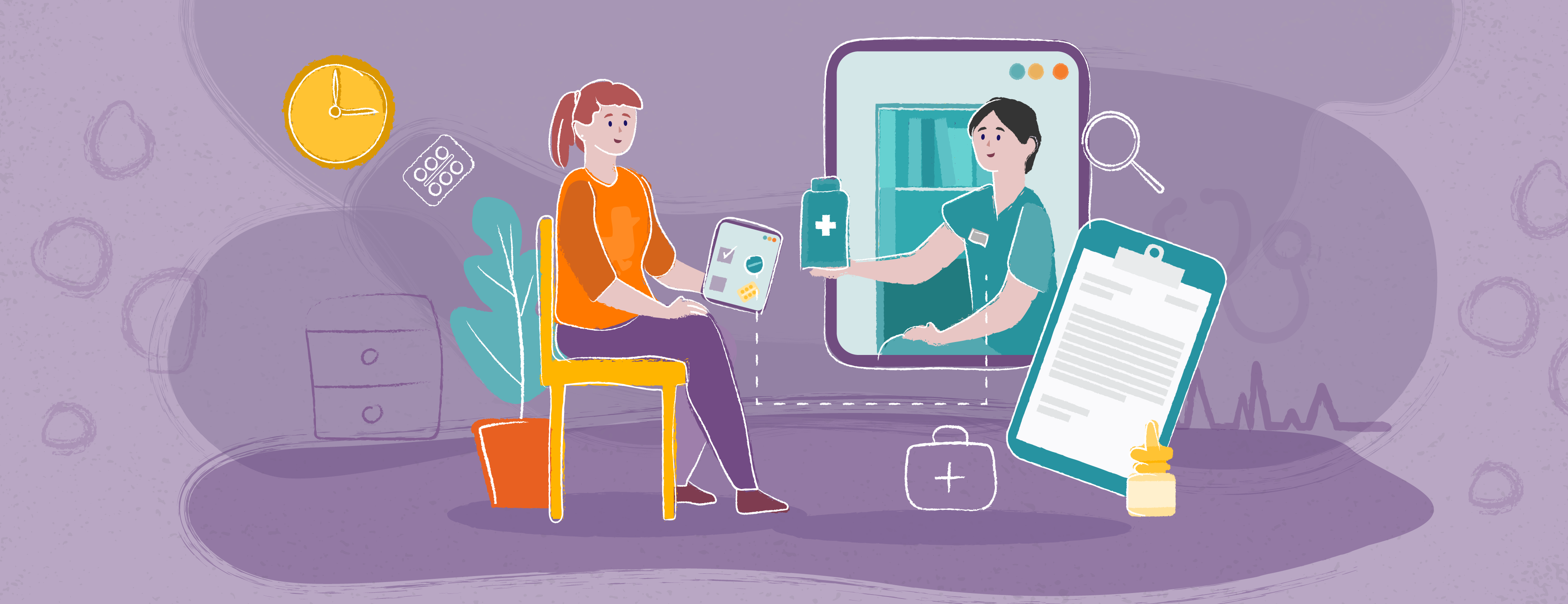Transforming Patient Outcomes: The Impact of Generative AI in Healthcare
Will our family doctor soon be a medical professional using an advanced AI chatbot? Or will we follow the example of today’s Internet users who try to diagnose themselves with a “Google Doctor” and independently check our health with one of the many specialized medical chatbots?
We don’t know exactly how this AI gene will develop in the future, but it’s difficult to deny that the technology is already changing medicine right before our eyes.
TL;DR
- Generative AI is revolutionizing healthcare by improving diagnostics, enabling highly personalized treatment plans and accelerating drug discovery, along with the potential to vastly improve patient outcomes.
- The successful implementation of generative AI in healthcare requires significant organizational adjustments, including infusing AI culture, developing infrastructure, training staff, and ensuring both data quality and security.
- Emerging challenges with healthcare generative AI involve navigating ethical concerns such as privacy, consent and bias to ensure equitable and fair healthcare without compromising patient trust.
How Can Generative AI be Used in Healthcare?
Generative AI is a game-changer and driver of the digital transformation in healthcare. It is setting the stage for a new era in healthcare by diagnosis support, enhancing interoperability, accelerating discovery and enabling true personalization.
When it comes to generative AI in healthcare use cases, we’re seeing a few key trends and areas of emerging potential:
- Diagnosing diseases
- Developing treatment plans
- Discovering new drugs
- Enabling personalized services
The global generative AI in healthcare market size reached $1.07 billion in 2022, and is expected to exceed approximately $21.74 billion by 2032.
This should not be a surprise with the generative AI’s outstanding ability to analyze troves of data, learning and generating previously unreachable insights.
Diagnostics Advancements
Generative AI plays a pivotal role in enhancing the analysis of medical images like X-rays, MRIs and CT scans, assisting radiologists in diagnosing diseases more accurately and quickly. As a result, it’s improving the efficiency of emergency departments by accelerating patient processing when dedicated radiology services are unavailable.
Beyond this, generative AI can even generate high-quality medical images, addressing the scarcity of diverse and extensive datasets, and bolstering the training of diagnostic systems. This synthetic data mitigates the problem of overfitting (a situation in which data becomes too reliant on initial datasets, making additional data difficult to implement), boosting the ability of AI models to render accurate diagnoses across different patient groups.
By analyzing a broad array of data from electronic health records, electronic medical records and medical imaging, generative AI can substantially improve diagnostic accuracy.
However, it’s important to note that, currently, most legislation requires a human, certified doctor to make a final diagnosis. Generative AI serves as a powerful tool for assistant doctors. Ultimately, however, it is the physician that makes the final conclusions. As doctors are both professionally and legally responsible, explainability will be a growing area of development for generative AI in healthcare.
Personalized Treatment Plans
Generative AI is not just revolutionizing the diagnosis process; it’s also transforming treatment plans. Clinics and hospitals will leverage AI to develop personalized health plans that consider a patient’s unique genetic makeup, health history and lifestyle, thereby advancing preventative medicine. Generative AI will analyze extensive patient data to identify individual health factors influenced by genetics, lifestyle choices, and environmental conditions, which informs the personalization of treatment approaches.
In addition, generative AI can:
- Recommend tailored treatment regimens by evaluating large patient datasets to determine optimal medication dosages
- Predict possible adverse reactions unique to each individual
- Provide tailored care, guided by generative AI, to improve patient outcomes by more precisely targeting their specific health needs, including the adjustment of medication based on genetic information.
As a result, patient engagement and empowerment are heightened as individuals feel their healthcare is more directly catered to their personal needs. Once again, however, we need to remember that such tools have a limited capacity from a legal perspective. A generative AI fitness plan is one thing, but medication and treatments still need to be signed off by a doctor, who then assumes responsibility.

Drug Discovery Acceleration
The pharmaceutical industry is also reaping the benefits of AI in healthcare. AI can accelerate drug discovery by generating novel molecular structures, repurposing existing drugs or enhancing drug formulations.
In addition, AI models are revolutionizing the pharmaceutical industry by predicting drug interactions, aiding in the design of safer and more effective drug regimens, and optimizing clinical trials. By accurately predicting patient responses, determining optimal dosages, and selecting the best candidates for trials, AI significantly reduces the time it takes to bring new drugs to market. This technological advancement not only streamlines the drug development process but also enhances the safety and efficacy of medications available to patients.
Enhancing Patient-Provider Communication with Generative AI
Generative AI is transforming the landscape of healthcare beyond diagnostics and treatment, significantly enhancing communication between patients and providers. Here, we can many use cases of generative AI in healthcare:
- Through the real-time interpretation of patient speech, healthcare gen AI can aid in helping patients convey important details to doctors.
- Likewise, such solutions can aid doctors in translating complex medical terms into simpler language, helping patients to understand vital healthcare information.
- Generative AI’s ability to analyzing speech for both tone and sentiment can also ensure that the nuances of communication are not lost, facilitating a more emphatic and understanding experience.
These are just a few examples of gen AI for healthcare, but it’s clear that such technology can aid patients before, during and after each medical appointment. From automating customer service to aiding doctors in their medical work, generative AI provides a personalized and data-driven companion. Information collection and reporting are also made more efficient with generative AI, leading to resolved uncertainties and a succinct summary of data for healthcare providers.
Furthermore, by analyzing patients’ medical histories, it can proactively address their needs by predicting questions or concerns they may have. Additionally, generative AI’s ability to analyze speech for tone and sentiment ensures that the nuances of patient communication are not lost, facilitating a more empathetic and understanding healthcare experience.
Streamlining Administrative Tasks
With healthcare providers often burdened with administrative tasks, generative AI can make a significant difference. Generative AI technologies are reducing the administrative burden on clinicians by streamlining clinical note generation.
For instance, Google Cloud is advancing its capabilities with the development of Vertex AI Search, a powerful engine tailored for rapid generative AI-based search engine creation. The latest enhancements to this tool are especially beneficial for the healthcare sector, simplifying the search and analysis of patient records and health data from diverse sources.
Moreover, generative AI is making appointment scheduling more efficient, tailoring schedules to patient history and provider availability to reduce wait times.
Generating Customized Patient Education Materials
Generative AI can also enhance patient education by creating personalized health education materials tailored to individual patient conditions, treatment plans, cultural backgrounds, and preferred learning styles. By utilizing generative AI, educational materials can be culturally sensitive and emotionally resonant, using idioms and expressions relevant to the patient’s background.
With dynamically adapted educational content, generative AI can adjust to real-time changes in a patient’s health profile and literacy levels. Some additional benefits of using generative AI in healthcare education include:
- The ability to personalize educational content based on individual patient needs.
- Real-time updates to educational material as new information becomes available.
- Interactive features that enable patients to ask questions and receive clarifications, enhancing understanding and decision-making.

Implementing Generative AI Tools in Healthcare Organizations
While the potential of generative AI is immense, implementing it in healthcare organizations is a significant task. It requires a cross-functional leadership group and a thorough evaluation of healthcare operations, talent and technological capabilities.
Investment in the AI tech stack is crucial for healthcare organizations to prepare for the later expansion of generative AI uses. To enable the secure training of generative AI models, data processing must occur within secure firewalls. Strategic partnerships and interoperability investments are crucial for healthcare leaders to ensure the fidelity and accuracy of data used by generative AI.
Educational resources and guidelines are also necessary for providing healthcare professionals with the skills to use generative AI platforms effectively. And let’s not forget about the legal limitations.
Ensuring Data Quality and Security
When it comes to the implementation of generative AI applications in healthcare sector, the importance of data quality and security cannot be overstated. For these AI systems to deliver accurate and contextually relevant outcomes, they must be fed high-quality data. Any issues in data quality, if left unaddressed, can deteriorate over time, leading to compromised results. Moreover, stringent data security protocols are necessary to ensure the protection of sensitive patient information.
To uphold the confidentiality of patient data, robust privacy and security measures must be meticulously planned and executed. This includes the strategic management of both structured and unstructured data, a comprehensive understanding of the sources of this data, and the implementation of controls to properly deploy and safeguard sensitive information. Regular audits are crucial to spot and mitigate any biases, while employing techniques such as Explainable AI (XAI) can greatly enhance the transparency of the algorithms used. Together, these practices form the backbone of a secure and reliable generative AI application in healthcare, safeguarding the integrity and confidentiality of patient data.
The greatest challenge, however, lies in the need to anonymize any patient data. This is to both protect data from leaking, and to ensure that only a patient’s medical staff have any access to sensitive information. Such anonymization must happen before the data is accessed via the generative AI.
It’s only in specific AI use cases, such as directly interaction with specific patients, that such access can be enabled – and even then, it must be stringently monitored.
Training and Upskilling Staff
For generative AI to be effectively utilized in healthcare settings, it’s essential to train and upskill healthcare staff. This includes teaching them to supervise AI models and integrate these tools seamlessly into their daily routines. Realistic training simulations created by generative AI can prepare healthcare workers to handle real-life scenarios safely.
Moreover, continuous education and upskilling are necessary to ensure healthcare staff can adapt to rapid technological advances and optimize healthcare accessibility and results.
Regular auditing and testing for biases are crucial for AI models to support fair and transparent healthcare decisions. Establishing continuous monitoring systems and feedback mechanisms is fundamental to maintain the efficacy of AI models as healthcare technology evolves.
Addressing Ethical Concerns and Potential Risks
While generative AI holds immense potential in healthcare, it’s also important to address ethical concerns and potential risks. Healthcare leaders must prioritize the responsible and safe use of generative AI technology, aligning with ethical frameworks to protect patient privacy, ensure equitable clinical outcomes, and enhance healthcare provider experiences.
Generative AI raises new challenges in accountability and liability for patient trust, as well as acceptance. Moreover, there is a risk of bias in patient care plans if generative AI-powered platforms base their algorithms on data sets that overrepresent certain patient populations.
Data Privacy and Consent
Data privacy and informed consent are critical factors when it comes to the use of generative AI in healthcare. The capacity of such AI to create synthetic medical data and augment existing datasets, presents new opportunities for medical research that lies beyond the scope of traditional privacy regulations.
However, this also carries significant risks to patient privacy, especially as these systems are trained on substantial quantities of sensitive patient data.

Upholding data protection principles, such as those outlined in the Health Insurance Portability and Accountability Act (HIPAA) of the US, or even the General Data Protection Regulation (GDPR) framework in the EU, plus the regulations of each country regarding medical-specific data, is critical to preserving patient confidentiality and securing their trust in the use of AI in healthcare.
The informed consent process in the era of AI healthcare necessitates transparent communication regarding the use of patient medical records, diagnostic procedures, and treatment protocols, ensuring that patients’ consent is specific and voluntary. So, in addition to anonymizing data where possible, patients must also be fully notified of such processes to establish trust in a sector known for privacy.
Bias and Fairness
Addressing bias and fairness is another crucial aspect when using generative AI in healthcare. Generative AI models must be fed with a diverse range of high-quality and representative datasets to mitigate bias and ensure equitable healthcare outcomes across different patient groups.
Algorithmic bias remains a significant risk in healthcare AI, potentially leading to inequalities and unfair treatment if training data includes implicit biases. Collaborative efforts among healthcare professionals, ethicists, and data scientists are critical for identifying and minimizing sources of bias in generative AI.
Addressing ethical principles such as justice is essential to prevent generative AI from exacerbating social inequalities and promote its role in fostering social justice in healthcare.
Generative AI Use Cases in Healthcare
There are already numerous companies leveraging the benefits of the generative AI in healthcare.
Bayer Pharmaceuticals is exploring how generative AI solutions can streamline the development of new pharmaceutical products. Using Google Cloud’s Vertex AI and Med-PaLM 2, Bayer aims to speed up drug discovery processes, including accessing and correlating data, mining research data for connections, and automating tasks like drafting clinical trial communications and translations.
Another interesting example of AI in healthcare is HCA Healthcare, which is just one of the growing number of US healthcare providers working with Google Cloud to leverage generative AI for reducing the administrative burden on doctors and nurses. The solution currently being piloted extracts information from physician-patient conversations to create medical notes, using an app developed by Augmedix. This initiative aims to free up healthcare professionals’ time by automating the creation of clinical notes and improving the process of patient handoffs between nurses.

Another generative AI use in healthcare is Amazon Web Services’ AWS HealthScribe, a revolutionary service that assists healthcare software developers in creating applications focused on note taking, transcription, and the detailed analysis of interactions between patients and doctors. These innovations exemplify how technology giants are facilitating more efficient and insightful healthcare services.
Future of Generative AI in Healthcare
Generative AI and healthcare are becoming an inseparable pair. Gen AI in healthcare is revolutionizing diagnostics, personalizing treatment plans, and accelerating drug discovery. Its implementation is significant, requiring organizational readiness, staff training, and careful consideration of ethical concerns and potential risks.
Yet, as evidenced by the real-world applications of generative AI in healthcare and success stories, its potential to improve patient outcomes and revolutionize the healthcare industry is immense. As we continue to harness this potential, the future of healthcare looks promising, with generative AI at its core.








